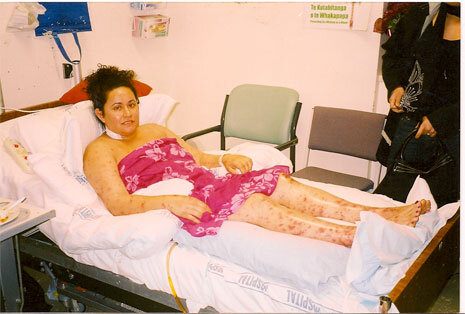Tania's Story
Tania's Story
Tania, a cultural psychologist and professional evaluator, contracted meningococcal septicaemia in late 2003. At the age of 40, with a significant work project underway and a growing family, the possibility of contracting such a disease was not even on the radar. Timely medical intervention, a strong will to live and unwavering family support ensured Tania’s survival. This is her story.
I woke early one Saturday morning in late September with intense pain in my lower back. It was preventing me from sleeping – I told myself it was just back pain from working long office hours, took some Panadol and tried to go back to sleep.
I struggled through that morning, driving myself to a group meeting I had planned at university (something I now cannot remember). However, the pain wasn’t going away. Knowing something wasn’t right, I then drove myself to the doctor around lunchtime. I had a feeling it may have been a problem with my ovary, as I had a small ovarian cyst a few years earlier.
Seeing that I was in severe pain, but not knowing why, my GP called the National Women’s Hospital, asking them to admit me and conduct some tests. I was admitted around 1pm and after some preliminary tests (confirming the problem was not my ovary), they kept me in for observation.
My condition deteriorated rapidly during the afternoon. One of my visiting sisters noticed how hot and feverish I was, commenting on my constant requests for drinks and ice creams. Around 7pm, my sister also noticed little ‘cat scratches’ on my left leg, and her son mentioned this to the nurse.
Following periodic medical checks throughout the evening, the registrar (going on ‘a hunch’ that I was showing the early signs of a rash), arranged my transfer to Auckland Central Critical Care. I was later told that I was going into septic shock.
Following periodic medical checks throughout the evening, the registrar (going on ‘a hunch’ that I was showing the early signs of a rash), arranged my transfer to Auckland Central Critical Care. I was later told that I was going into septic shock.
My memory of this time is very vague – I guess similar to what happens to some people in a car crash, some things I just don’t remember and some pieces have been given to me by family and friends
I was in a coma in the Critical Care Unit for four days. On my arrival to Auckland Hospital in the early hours of Sunday morning my family tell me they received calls from the medical staff to ‘come straight away’ saying that ‘she may not make it until tomorrow’. This was particularly hard on my parents and oldest daughter in Tonga, with no planes leaving until the Monday morning.
The pain of the disease was horrific - it’s like burning from the inside. I’m just grateful my children have not experienced it.
The critical care team were amazing, allowing my extended family to visit, pray and apply Manuka honey and honey bandages to my lesions, instead of traditional hospital dressings. I believe this, along with the antibiotic medical intervention, is a big factor in my recovery. I think it also explains why I did not get secondary infections, a real issue in healing for many meningitis survivors.
I was moved to the Infectious Diseases ward after Critical Care, and remained in hospital until late October.
A few weeks later we moved to Waiheke Island to be near the ocean for my recovery, relying heavily on my family. I couldn't walk and needed a wheelchair, a walker and then crutches. It was several months before I could walk unassisted.
I believe I have internal scar tissue around my abdomen, where it all started, and my chest. My legs, ankles and feet are not very strong anymore, limiting my ability to run and enjoy the sports I used to.
Unfortunately there is still limited awareness of the disease and the early identification of symptoms. It’s certainly now in my broader family’s consciousness, and with the awareness of the severity of meningococcal septicaemia and how quickly victims can deteriorate, they keep a close eye on each other and their children if they are ill.
Although what I experienced was both terrifying and traumatic – it has also been an incredible learning experience and has motivated me to join the Meningitis Foundation in the fight to eliminate this dreadful disease.
Although what I experienced was both terrifying and traumatic – it has also been an incredible learning experience and has motivated me to join the Meningitis Foundation in the fight to eliminate this dreadful disease.
When I look back now I have no doubt three things kept me alive - medical intervention with antibiotics (within a supportive health system), my own will to live and the presence of my loved ones. They were always there - I was never left alone.
Malo ‘aupito - ‘Ofa lahi atu – Kia ora koutou – Thank you everyone for your love and kindness.


